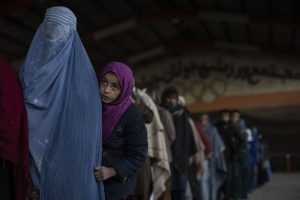The third round of special envoy meetings in Doha for the purpose of increasing international engagement with Afghanistan in a more coherent, coordinated, and structured manner will occur from June 30 to July 1. It is important to be mindful of the nuances of engagement with the Taliban and all stakeholders on Afghanistan. The departure of U.S. forces indicated a significant shift in the political landscape, underscoring the pressing need for innovative and inclusive strategies to navigate the complexities of post-conflict scenarios.
Afghanistan faces tremendous challenges, such as human rights crises (especially regarding the rights of women and girls as well as religious and ethnic minorities), security and terrorism, narcotics, development, and economic and social cohesion. Armed opposition to the Taliban, led by the National Resistance Front (NRF) and other groups and non-armed resistance forces, particularly the Afghan women’s movement, have played a key role in the non-recognition of the Taliban by defying their policies and keeping a spotlight on Afghanistan. But in order to chart the path ahead, sustained dialogue, collaboration, and unwavering commitment from all stakeholders and sides will be needed to end the current crises and move toward a resolution of the wider conflict.
This is possible only through forming an inclusive government in which citizens’ right to determination is respected, including ensuring the full and equal participation of women in public life. For the success of the Doha process that emanated from Security Council Resolution 2127 and the U.N. independent assessment on Afghanistan, alongside the consensus among regional and Western countries, the full participation of all interested parties of Afghanistan is vital.
The Taliban refrained from participating in the second round of Doha talks and denounced the participation of the representatives of Afghanistan’s civil society. The Taliban’s narrative of being the only party representing Afghanistan is baseless. Despite the Taliban’s despotic rules and the clear risks, people in Afghanistan frequently protest against them and express their resentment, particularly brave Afghan women who face a gender apartheid. Thus, the argument that the Taliban’s reality is the only “reality” worth heeding in Afghanistan overlooks the country’s population of 30 million and is a dangerous narrative that can fuel further resentment, instability, and conflict.
As Secretary General Antonio Guterres stated, the Doha meetings are an attempt to ensure that Afghanistan does not become a “hotbed” of terrorist activity and that it has inclusive institutions in which all its diverse groups feel represented in a “truly inclusive” state.
Thus to prevent Afghanistan from descending into more chaos, it is more pivotal than ever to seize this opportunity to find a comprehensive solution and invoke intra-Afghan dialogue with all sides of the conflict. While Afghanistan is still on the U.N. agenda, other emerging crises around the world increasingly divert world attention. This can become dangerous for Afghanistan since relying on regional governments to take the lead in engaging with the Taliban may result in a disaster for the Afghan people and international security.
The opportunity of the Doha process must not become another wasted attempt. These talks must be inclusive of all, including Taliban opposition groups as well as new, youthful, democratic forces that tirelessly challenge the status quo through various means.
For almost three years, these forces have doggedly pursued political and social activism, particularly by advocating for women’s rights and amplifying the voices of Afghans under the Taliban regime. This generation represents hope for Afghanistan’s future. Most of this generation gained education and experience during the Afghan Republic and worked in different sectors, from government policy to various legal and reconstruction projects. The collapse of the Republic government may have dismayed them, but they comprehend the multilayered domestic, regional, and international challenges Afghanistan faces. They are able to bring innovative ideas, energy, and new perspectives to the table and have the potential to hold constructive discussions with all parties involved in order to create common future together and overcome the current situation.
This generation can be included either through an intra-Afghan dialogue as per the recommendations of the U.N. assessment, the Vienna process, or other processes. While some may consider the state-building and democratization efforts of the Afghan Republic to be a failure, for myself and millions of other Afghans that period yielded enormous opportunity, especially in serving Afghanistan.
It provide me, as a girl, equal rights to equal to education and work through which I achieved the greatest pride of my life in representing my country as a diplomat in London, and now researching Afghanistan, advocating for Afghanistan, and amplifying the voices of my people on the world stage. Similarly, many Afghans will not give up hope, nor cease their efforts to strive and achieve a better future.
Ultimately, because navigating Afghanistan’s complexities requires a deep understanding of the country’s history, culture, and political landscape, the international community’s engagement with Afghanistan over the past two decades has been marked by both progress and challenges. As we move forward, it is essential to adopt a principled and multifaceted approach that prioritizes the empowerment of Afghanistan’s next generation, promotes human rights and democracy, and addresses the root causes of conflict, instability and extremism. By doing so, we can help create a more stable and prosperous Afghanistan, where its citizens can thrive and contribute to regional and global progress. Despite setbacks and challenges along the way, the Afghan people have shown resilience and determination in their quest for a better future.
It is our collective responsibility to support the Afghan people in their mission or a brighter future and to learn from the lessons of the past to build a better future for all.

































